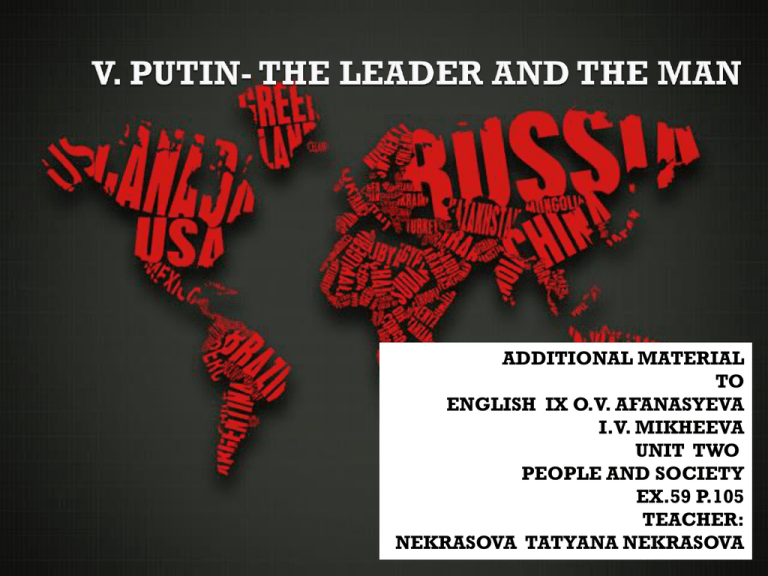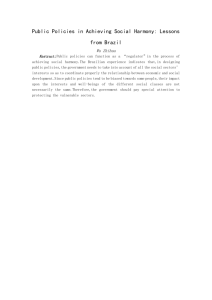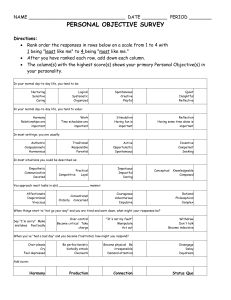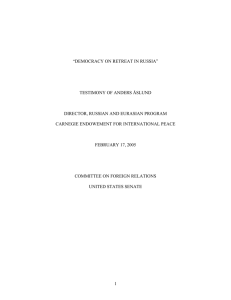Document 9953460
advertisement

ADDITIONAL MATERIAL TO ENGLISH IX O.V. AFANASYEVA I.V. MIKHEEVA UNIT TWO PEOPLE AND SOCIETY EX.59 P.105 TEACHER: NEKRASOVA TATYANA NEKRASOVA Brainstorm: If there is harmony in the heart, there will be harmony in the family. If there is harmony in the family, there will be harmony in the nation. If there is harmony in the nation, there will be harmony in the world. (Confucius ) Сomment on the quotation line by line… Line 1. If there is harmony in the heart, there will be harmony in the family. Line 2. If there is harmony in the family, there will be harmony in the nation. Line 3. If there is harmony in the nation, there will be harmony in the world. Definitions: The term democracy – (Greek ) -"rule by the (simple) people“. Democracy is «Government of the people, by the people, for the people» Abraham Lincoln (1809-1865) Wikipedia: “A politician is an individual who is a formally recognized and active member of a government, or a person who influences the way a society is governed through an understanding of political power and group dynamics.” The Russian Federation Russia is a democratic federative state based on rule of law and a republican form of government. According to the Constitution Russia is a Presidential Republic State power in Russia is exercised by the President, the Federal Assembly, the Government and the Courts. The national symbol of Russian is a white-blue-red flag, the hymn, a two-headed eagle-the coat of arms, the Kremlin, a lot of ancient Cathedrals and many others… Study the information and fill the table: •The head of state is the president and is elected directly by the people every four years and cannot serve more than two terms. •The President is commander in chief of the armed forces; he makes treaties, enforces laws, and appoints ministers. •The Federal government consists of three branches: legislative, executive and judicial. •The legislative power is vested in the Federal Assembly. It consists of 2 chambers: the Council of Federation and the State Duma. • The executive power in Russia belongs to the Government. The president appoints its head - the Prime minister. •The judicial power belongs to the system of courts. It consists of the Constitutional court, the Supreme Court and regional courts. •There are many political parties in our country: The Democratic, the Communist, the Liberal and many others. The President The Federal Assembly The Duma The Federation Government The Federal Government The Chairman of the Government, Ministers The Supreme Court of Russian Federation The Constitutional Court of the Russian Federation All men and women over 18 Finish the sentences: Fill the Table The head of state is …… The President is elected by….. The President can serve….. The President is Commander….. He makes …….., enforces………, and appoints….. . The Federal government consists of….. The legislative power is vested in ……. The judicial power belongs to….. The main law is…. There are many political parties: ….. The political system The head of state Legislative Branch of power Executive Branch of power Judicial Branch of power Main political parties Study the brief information and answer the questions: -born in Leningrad ( October, 7, 1952) -graduated with a degree in law from Leningrad State University (1975) -earned a Ph.D. degree in economics -was assigned to work in the Committee for State Security (KGB) - served in East Germany -became the assistant to the rector of Leningrad State University (1990) -was appointed Prime Minister ( August 1999) -became acting President (December31, 1999) -was elected president of Russia (on March 26 2000) -was inaugurated as president (May 7, 2000) -was elected President of Russia for the second term ( March 14, 2000) Putin's father, Vladimir Spiridonovich Putin with his mother, Maria Ivanovna, in July 1958 KGB career Putin served 15 years as a foreign intelligence officer for the Committee for State Security (KGB), including six years in Dresden(1985 to 1990), East Germany. Political career Russian intelligence officer and politician who served as president (1999–2008, 2012– ) of Russia and also was the country’s prime minister (1999, 2008–12). On May 7th 2012, V. Putin was elected president of Russia for the 3rd term. In 1990 he retired from active KGB service with the rank of lieutenant colonel and returned to Russia to become prorector of Leningrad State University. Soon afterward Putin became an adviser to Sobchak, the first democratically elected mayor of St. Petersburg. He quickly became known for his ability to get things done; by 1994 he had risen to the post of first deputy mayor. In 1996 Putin moved to Moscow, where he joined the presidential staff as deputy to Pavel Borodin, the Kremlin’s chief administrator. Putin moved up in administrative positions. ... •слабое, неэффективное государство resurrect Russia •слепо выполнять foreign debts •возродить Россию reduce taxes •коррупция среди чиновников the privatization of agricultural land •смягчение экономических реформ •снижение налогов took steps to partnering with … •приватизация сельскохозяйственных warming strict economic reforms земель to increase cooperation •долги перед зарубежными странами weak and ineffective state •предпринять шаги к партнерству to wield tremendous power •повысить сотрудничество to pay bribes •удерживать огромную власть blindly follow •давать взятки white collar corruption Just in his off-time Putin is a judo champion, an avid hunter, a fisherman, a scuba diver … an all-around man’s man… . Who will be the next president? http://putin.kremlin.ru/bio http://www.biography.com/people/vladimir-putin http://en.wikipedia.org/wiki/Vladimir_Putin http://global.britannica.com/EBchecked/topic/484357/Vladimir-Putin Teacher: Tatyana Nekrasova Gymnasium 1 Komsomolsk-na- Amure





